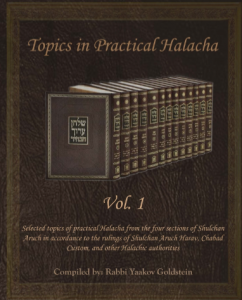This article is an excerpt from our Sefer

Buy me here or on Amazon.com
Answering Baruch Hu Uvaruch Shemo to a blessing that one is being Yotzei:[1]
In all situations that one hears a blessing and has in mind to fulfill his obligation through hearing it, such as by Kiddush or Havdala, and blessings said over fruits and over the Mitzvos, he is not to answer Baruch Hu Uvaruch Shemo [upon hearing Hashem’s name said in the blessing].[2] It is imperative to warn the public of this matter, as many are unaware of this and incorrectly answer Baruch Hu Uvaruch Shemo.[3]
Bedieved:[4] In the event that one said Baruch Hu Uvaruch Shemo to a blessing that one is hearing to be Yotzei, it is possible that even Bedieved he does not fulfill his obligation of the blessing.[5] For this reason it is imperative to warn the public of this matter, as many are unaware of this and incorrectly answer Baruch Hu Uvaruch Shemo. [Thus, if one said Baruch Hu Uvaruch Shemo by the blessing he is to try to hear the blessing again from another person.[6] In the event that he cannot hear the blessing again from another person, he nevertheless fulfills his obligation of the blessing.[7] He is not to repeat the blessing even without Sheim Umalchus.[8]]
_____________________________________________________________________
[1] Admur 124:2 in parentheses and 192:2; Dvar Shmuel 295; Shoshanim Ledavid Brachos 8:8; Degul Merivava on M”A 124:9; Mateh Yosef 124:2; Kitzur SHU”A 6:9; Birkeiy Yosef 213:3 “Best to be stringent”; Chayeh Adam and other Achronim brought in M”B 124:21; Kaf Hachaim 124:26; See Shraga Hameir 5:55; Piskeiy Teshuvos 585 footnote 29; 124:11 footnote 106; Mishneh Halachos 13:16
Other opinions: Some Poskim rule one may answer Baruch Hu Uvaruch Shemo even if he plans to fulfill his obligation with the blessing. [Maaseh Rokeaich 1:11, brought in Kaf Hachaim ibid; Birkeiy Yosef ibid “One is not protest against those who are accustomed to do so”]
[2] The reason: Whenever a person is hearing a blessing with intent to fulfill his obligation, such as by Kiddush, Havdala and blessings over fruits and Mitzvos, he may not answer Baruch Hu Uvaruch Shemo, being that one who hears [and fulfills his obligation] is like one who is saying it himself and it is forbidden to make an interval in the midst of a blessing. [Admur 124:2 in parentheses]
[3] Admur ibid
[4] Admur ibid; Chayeh Adam brought in M”B 124:21; See Shraga Hameir ibid that in such a case he also missed the words “Elokeinu Melech Haolam” of the person saying the blessing; See Minchas Elazar 1:20
Other opinions: Some Poskim rule that if one answered Baruch Hu Uvaruch Shemo he nevertheless fulfills his obligation. [Conclusion of M”B ibid; Maharam Shick 51; Birkeiy Yosef 213:3 in name of Maharash Abuhav; Piskeiy Teshuvos 124:11 and 585:3]
[5] The reason: It is possible that even Bedieved one does not fulfill his obligation as since he made an interval between Hashem’s name and Malchus with words that were not instituted by the Sages, he has therefore swerved from the dialect of the blessings that was set by the Sages. [Admur ibid in parentheses]
[6] Ketzos Hashulchan 22 footnote 11
[7] Ketzos Hashulchan 22 footnote 11
The reason: As Admur writes “it is possible that he does not fulfill his obligation” and we always rule in a case of doubt that Safek Brachos Lihakel. [ibid]
[8] Ketzos Hashulchan ibid
The reason: Although in general we rule that whenever there is a Safek of blessings one should repeat the blessing without Sheim Umalchus, nevertheless, here he is not to repeat it as a) If he is doing a Mitzvah after the blessing, saying a blessing without Sheim Umalchus would be an interval between the original blessing that he heard, and was possibly Yotzei with, and the Mitzvah. Furthermore b) Saying Baruch Hu Uvaruch Shemo in between the Sheim and Malchus is certainly no worse than saying a blessing without Sheim Umalchus all together and hence there is no advantage for one to say it. [ibid]



Leave A Comment?
You must be logged in to post a comment.